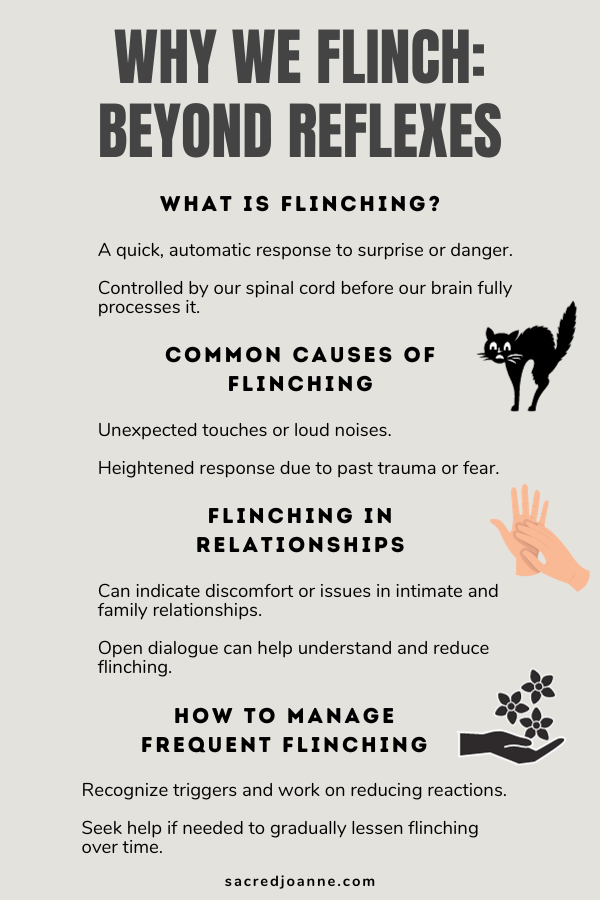Why Do I Flinch When Someone Touches Me? From Trauma to Triggers

If you’ve ever thought, “Why do I flinch when someone touches me?” you’re not alone.
Flinching is a natural and instinctive response to various stimuli, including touch.
It is a reflex that often occurs without conscious control and involves the body’s sudden jerking or twitching movement.
There are many reasons why people may flinch when touched, including fear, anxiety, surprise, or past trauma.
In this article, we will explore the factors that can cause the flinch response and provide strategies for managing this reflex.
Why do I always flinch at everything?
Flinching when someone touches you can be a natural reflex response.
Still, it can also be a symptom of trauma, anxiety, or other mental health conditions.
It still can be a problem when it happens with the people you love the most. You keep wondering…
- Why do I flinch when my boyfriend/girlfriend touches me?
- Why do I flinch when my dad/mom touches me?
Here are some reasons why you may flinch when someone touches you, as well as reasons why you may not like physical touch:
Trauma
If you have experienced physical, sexual, or emotional abuse, your body may be hypersensitive to touch.
This can cause you to flinch when someone touches you or avoid physical touch altogether.
Anxiety
People with anxiety disorders may have a heightened sense of threat perception, causing them to react with a flinch response to stimuli they perceive as potentially dangerous.
This can include physical touch from others, particularly if they feel uncomfortable or unsure about the situation.
Sensory Processing Disorder
Some people may experience a hypersensitivity to touch due to a condition called sensory processing disorder.
This can cause physical touch to feel uncomfortable or even painful, leading to a flinch response or avoidance of physical contact.
Cultural or Personal Boundaries
Some people may have personal or cultural boundaries that dictate their preferences around physical touch.
This can lead them to flinch or avoid physical touch, even if they do not have a history of trauma or anxiety.
Specific Triggers
In some cases, certain types of touch or specific people may trigger a flinch response.
For example, if you have had negative experiences with romantic partners, you may flinch when your current partner touches you.
Body image issues
Some people may not like physical touch due to body image issues or a lack of confidence in their physical appearance.
They may feel self-conscious or uncomfortable with physical contact.
Communication issues
Some people may struggle to communicate their boundaries or preferences around physical touch, leading to discomfort or avoidance of physical contact.
Neurological conditions
Certain neurological conditions, such as autism or Tourette syndrome, can cause hypersensitivity to touch or a dislike of physical contact.
Personality traits
Some people may simply have a personality that does not enjoy physical touch, even if they do not have any underlying trauma, anxiety, or medical conditions.
Respecting people’s preferences and boundaries around physical touch is important.

Why do I get angry when someone touches me?
Here are some possible reasons why you may get angry when someone touches you:
Past trauma or abuse
If you have experienced physical, sexual, or emotional abuse in the past, physical touch can be triggering, causing you to react with anger or aggression.
Personal or cultural boundaries
Personal or cultural boundaries around physical touch can make you angry or uncomfortable when someone touches you without consent or outside your comfort zone.
Sensory processing disorder
Some people may experience a hypersensitivity to touch due to a condition called sensory processing disorder.
This can cause physical touch to feel overwhelming or even painful, leading to anger or frustration.
Anxiety or fear around physical touch
If you have a general discomfort with intimacy or have experienced negative experiences with physical touch in the past, you may have anxiety or fear around physical touch, causing you to react with anger or aggression.
Misinterpretation of intent
In some cases, anger in response to touch may result from misinterpreting the touch’s intent.
For example, if someone touches you on the shoulder to get your attention, but you perceive it as an invasion of your personal space, you may react with anger or aggression.
Control and power dynamics
If you feel like someone is touching you to assert their control or power over you, you may react with anger or aggression.
This can be particularly true in situations of sexual harassment or assault.
Boundary violations
If someone touches you in a way that violates your personal boundaries or makes you feel uncomfortable, you may feel angry or frustrated.
This can include anything from unwanted physical contact to comments about your body.
Pain or discomfort: If physical touch causes you pain or discomfort, you may react with anger or aggression as a way to protect yourself.
This can be particularly true if you have a medical condition that makes touch painful or uncomfortable.
Lack of consent
You may feel angry or violated if someone touches you without your consent.
This can be particularly true in situations of sexual harassment or assault.
Personality or temperament
Some people may have a naturally more aggressive or confrontational personality or temperament.
In these cases, the anger in response to touch may not necessarily be related to trauma or anxiety but instead a part of their natural response style.
Identifying the underlying reason for your anger in response to touch is essential to address the issue’s root cause.
Communicating your boundaries and feelings around physical touch can also help prevent misunderstandings and make you feel more comfortable and secure in your relationships.
Seeking support from a mental health professional or medical provider can also help manage your anger response and improve your overall well-being.
Why am I so jumpy when someone touches me?
Sometimes people may feel jumpy or startled when someone touches them. This can happen for different reasons:
Some people are susceptible to touch and may feel jumpy or startled even when touched gently or unexpectedly.
If someone has had bad experiences with touch in the past, they may feel anxious or fearful about physical contact, causing them to react with a jumpy or startled response.
Trauma or abuse can make a person’s nervous system more sensitive to touch, causing them to feel jumpy or startled.
This could be a sign of post-traumatic stress disorder (PTSD).
Some people have a condition called sensory processing disorder, which can make it hard for them to process touch and other sensory inputs.
This can cause them to feel jumpy or startled when touched.
Certain medical conditions, like fibromyalgia or chronic fatigue syndrome, can cause people to be hypersensitive to touch, leading to a jumpy or startled response.
Startle reflex
Some people have a stronger startle reflex, which means they react more quickly and intensely to unexpected stimuli, including touch.
Personality traits
Certain personality traits, such as high levels of neuroticism or introversion, may be associated with increased sensitivity to touch and a jumpy response.
Cultural or social norms
Physical touch may be less common or even discouraged in some cultures or social contexts.
If someone is not used to physical touch, they may feel jumpy or uncomfortable when it happens.
Lack of trust
If someone has trust issues or has been betrayed in the past, they may feel jumpy or on edge when touched because they don’t fully trust the person touching them.
Insecurity or low self-esteem
Insecurity or low self-esteem can make someone feel vulnerable or exposed, which may lead to a jumpy or defensive response when touched.
Why do I get scared when someone touches me?
Sometimes people might feel nervous or anxious when someone touches them. Here are some reasons why this could happen:
Trauma or abuse
If someone has experienced something wrong or hurtful in the past, they might feel scared or anxious when someone touches them because it reminds them of that bad experience.
Anxiety
If someone has a lot of worries and fears, they might feel scared or anxious about physical contact because they are worried about what might happen.
Autism or sensory processing disorder
Sometimes, people have trouble processing the feelings they get from touch. It can feel overwhelming and scary for them.
Personal boundaries
Everyone has their own personal boundaries around physical touch.
If someone touches you in a way that makes you uncomfortable or violates your personal boundaries, you might feel scared or anxious.
Cultural or religious reasons
Sometimes, different cultures or religions have different beliefs about physical touch.
If someone grows up in a culture or religion that discourages physical touch, they might feel scared or anxious when someone touches them.
Body dysmorphia or self-esteem issues
If someone is uncomfortable with their own body or has low self-esteem, they might feel scared or anxious when someone touches them because they are self-conscious or embarrassed.
Physical pain or illness
If someone is experiencing physical pain or disease, they might feel scared or anxious when someone touches them because it causes discomfort or aggravates their symptoms.
Trust issues
If someone has trust issues or has been betrayed, they might feel scared or anxious when someone touches them because they are worried about being vulnerable or hurt again.
Sensory overload
Sometimes, touching can be too much for someone, especially if they are already overwhelmed by other sensory stimuli.
Personal preferences
Ultimately, everyone has their own choices around physical touch. Some people simply do not like being touched, and that is okay.
It is vital to communicate your boundaries and respect the boundaries of others.
It’s okay to have different feelings and preferences around physical touch.
If someone feels worried or anxious when someone touches them, they can talk to a trusted adult or a mental health professional for help.
Does flinching mean abuse? Is it a trauma response?
Sometimes, when people experience scary or horrible things, their bodies can learn to react to certain things in a way that helps them stay safe.
Flinching is one way that our body tries to protect us from danger. It can happen when people touch us or when we hear loud noises.
It’s like our body saying, “Be careful!” Flinching can also occur when people feel really nervous or scared.
Chirophobia is when someone is terrified of hands.
This can be because they had a scary experience with hands before, or they learned to be scared of them from someone else.
Philophobia is when someone fears falling in love or getting close to people.
This can be because they had a bad experience before, or they learned to be scared of getting close to people from someone else.
If someone flinches a lot and it makes them feel upset or scared, they can talk to a grown-up they trust, like a teacher, parent, or doctor.
They can help them figure out why they’re flinching and how to feel better.
Sometimes, people need to talk to a special kind of helper called a therapist or take medicine to help them feel better.
It’s okay to ask for help!
Is flinching a good reflex? Are you weak if you flinch?
Flinching is a natural reflex that occurs in response to perceived threats or danger. It is a protective reflex that can help us avoid harm or injury.
In that sense, flinching can be seen as a “good” reflex, as it serves a protective function.
Flinching does not make a person weak and is not a sign of weakness or character flaw.
Instead, it is a natural and instinctive response to potential danger or harm.
People who have experienced trauma or anxiety may be more likely to flinch in response to various stimuli, but this does not reflect their strength or character.
It is important to note that chronic flinching, or flinching in response to stimuli that are not actually harmful, can interfere with daily life and be distressing.
If chronic flinching is causing distress or interfering with everyday life, seeking support from a mental health professional or medical provider may be helpful.
Treatment options may include therapy, medication, or a combination of both, depending on the underlying causes of the flinch response.
How to stop flinching when touched
Here are some tips to stop flinching when touched:
Identify triggers that cause flinching
Understanding what triggers the flinch response can help you prepare for and manage situations that may cause discomfort or distress.
Keep a journal or record of situations that trigger flinching to help identify patterns and develop coping strategies.
Practice relaxation techniques
Relaxation techniques, such as deep breathing or meditation, can help reduce stress and anxiety, which can trigger flinching.
Practice these techniques regularly to build resilience and improve your ability to manage the flinch response.
Seek support from a mental health professional or medical provider
If chronic flinching is causing distress or interfering with daily life, seeking support from a mental health professional, or medical provider may be helpful.
Treatment options may include therapy, medication, or a combination of both, depending on the underlying causes of the flinch response.
Gradual exposure therapy
Gradual exposure therapy can help desensitize your body to the triggers that cause flinching.
Start with small, manageable exposures and gradually increase exposure over time to build resilience.
Engage in physical activity
Physical activity can help reduce stress and anxiety, which can trigger flinching.
Regular exercise can also improve overall physical and mental health, reducing the likelihood of flinching and other anxiety or trauma symptoms.
Final Thoughts
In conclusion, flinching is a common reflex that can occur in response to various stimuli.
It can be a symptom of trauma, anxiety, or other mental health conditions. It may interfere with daily life and relationships.
However, it’s essential to understand that flinching is a natural and understandable response to these experiences. It does not indicate weakness or a character flaw.
Seeking support from a mental health professional or medical provider can help manage flinching and improve overall well-being.
Additionally, setting personal boundaries and communicating openly with others can help prevent misunderstandings and make us feel more comfortable and secure in our relationships.
By understanding the reasons behind flinching and taking steps to address them, we can learn to manage our reflexes and enjoy more fulfilling and healthy relationships with ourselves and others.
Featuring 10 powerful exercises, offering a glimpse into the transformative practice of shadow work.
